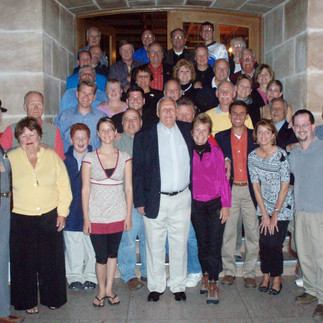How a WWII History Tour Inspired Sarah to Redefine Her Story
- DestinationUWendy
- May 26, 2022
- 7 min read
So if you've ever seen Band of Brothers or even like saving private Ryan, you get more curious about what really it was like to be in the middle of World War II, you know, as a kid, you know, you heard certain stories and yes, I had my history class, but unfortunately I did not appreciate history until after my grandparents had passed. So I didn't get to ask them more questions about what they knew of that time.
But I have traveled in Europe quite a bit. And every time I'm in Germany and in the areas where World War II battles were fought, it always raises more of my curiosity. So when I learned about Sarah's really amazing trip to go see the World War II sites with a veteran and learn much more in depth about what the day to day life was like for Easy Company and others.
Guests like Sarah share and inspire with tp forward or go on that epic adventure. What the experience was like, what they learned from it and how it's shaped much more than them going forward. And I hope our stories inspire and empower you to go after something on your live it now, list and take some action today.
So let's hop in as Sarah Blake shared her story about her European Tour of World War II sites and the amazing people she met on her adventure.

From Sarah: It all absolutely started with Memphis Belle - gotta love Harry Connick Jr. We did the mini series Band of Brothers, it was like a 10 part mini series. And I was like, this is fascinating. Ended up getting divorced. After that, I was like, I want to go on an international trip.
And the whole notion of doing something alone was a little scary to me, but I was like, okay, I'm not going to let that be an excuse. So what could I do if I wanted to go across Europe? And I was like, oh, I like Band of Brothers and found the Steven Ambrose Tour Company. He's guy who wrote the book.
And they actually have a Band of Brothers trip that starts in Camp Taccoa, Georgia, where they trained. And then we went over to England and then hit all the major spots. And the best part about this was there was going to be a World War II veteran from H Company that was going to be on the trip too. So you get like the real life living history experience.
I kept trying to find people to go with me and nobody was interested. Nobody would go. And I can remember a colleague had just told me his story, how he was up in the mountains, Rocky Mountains, and fell off his bike, busted himself all up. And I panicked for him like, oh my gosh, what have you broke a leg? What have you got bit by a rattlesnake? And you were there all alone. And just looks me dead in the eyes and goes, “see Sarah, that's why you'll never do anything alone and on your own.” And I was like, I'll show him. And I printed out the paperwork and signed and faxed my deposit.
That was February and the trip was in September. And I said, dang, it I'm going with or without anybody. I'm going to do this trip. So after, you know, after you got, after the gauntlet is down, you got told, you'll never go alone. You sign the check, you get going.
Oh my gosh, I'm actually doing this.
I quickly connected with several in the group and the five of us became friends and we called ourselves a Supper Club and we ended up not doing dinners with the rest of the tour group. And if it wasn't for me going solo and if it wasn’t for those folks basically adopting me, I wouldn't have experienced the trip the same way I did in the countries and with the conversations we had.
What was it like?
The tour did have a video, like a VCR thing on, on the bus. So before we would hit certain sites such as like a big field, like a farmers field, we’d learn we were at one of the very first encounters that Easy Company had and Band of Brothers and one of the military tactics that Captain at the time he wasn't Captain, but Captain Winners came up with was actually still taught at West Point today because of some tactics that he came up. And so that he came up with in the moment.
We'd see that on the bus and then get out and we could see, oh, you could actually see like the real distance of, you know, imagine a firefight going on and how somebody could come up with these tactics.
There were some museums that we would visit and, I think most of your audience will, but at least the term, the Battle of the Bulge will say, oh, I know something about that. And so that was the one place the Veteran did not get off. The bus was in the Ardennes Forest, right outside of the town of foil. And he sat there and I went on this trip to be, to get to know the Veteran. And so I would wait then he had his cane and sometimes the wheelchair and I'm like, are you sure you don't want to come out? And he's like, “I was here. I think it was 64 years ago. And my legs have not been the same sense. I've been there. I've done that. I don't ever need to see that again.”
And so that was like, oh, I mean, some of those moments, like it really hits you. And he tried to put on a brave face, he was there to help educate, to help the people that were paying for this trip, but he was like, “Nope, not gonna do it.” And so it was like, oh wow. Like, yeah, just, it just, it just kind of hits you of what they go through and that they, they really don't talk about it. And then to physically be back at a spot and to say, Nope, don't need to do that.
I learned things that I never thought I would have learned.
One of them was one of the things I learned was in Holland. So after the War, obviously there is lot, a lot of, a lot of the American soldiers are buried out in the Normandy Cemetery, but I didn't realize that there's a big cemetery in Holland. And after the War, the, the, the government decided that they were going to donate some of their best farming land to be the cemetery for the American soldiers that had died. Like they deserve to be in the best soil because they gave their lives for our freedom.
And I found it fascinating. The only way I can really figure out how to the analogy of like, if you're from, if you're from a big like football city and you have season tickets, like for us, for Denver, Denver Bronco tickets, season tickets typically get passed down generation to generation, to generation. Well, that's similar to what happens there.
The soldiers burial sites, a family will adopt a fallen soldier and they care for that site. And they also learn everything about that soldier in their history, where they grew up, how when they first enlisted and they also know where they died. And so when family members come out, American family members come out, they can get connected with the family who has adopted the grave site.
And that family will take them on tours to say, you know, this is where, and that is actually one of the, one of the things that really hit me was it was not scheduled part of the tour. But a family member that had adopted a young gentlemen and site took us out, took the entire bus out to, and it was somebody that Fred knew and took us out to this.
Fred is the Veteran. That is the H Company Veteran that was on the trip. I mean, everybody should just know who Fred is. When I say Fred and World War II. So we were looking at this little gully, it just, just a little bit of a gully. And it was there when Fred found out this is where the 17 year old kid he knew was killed. And Fred was carrying the guilt. Fred didn't know where the kid actually ended up dying, but he knew that he sent this kid out on a mission to deliver a message and the message never got delivered because the kid was killed.
And there was so much survivor's guilt. It was just emotion, but he could not control of guilt of, of feeling like he sent somebody to their death in there.
It was, there was always more than just one person that, but that, that's what the, that's what the people of Holland will do is that they will, they know the stories, they know where the, where the, where fallen soldiers were and to be able to bring that to life and give people closure.
That was a beautiful experience to see that. But that also is the thing that made me go like, in the back of my mind, that's what like five days until the end of the trip, but it was always kind of in the back of my mind of 17…..I'm 31, man. Like those, I almost lived twice the lifetime of them and what am I doing with my life?
To hear the rest of the story, including the one life-altering advice she was given while on the tour that kickstarted her bucket list, check out the podcast or YouTube video version for more photos of Fred, the Supper Club and some of the sites they visited. I hope you’ll also check out two items from my favorite gear that would make your travels a bit more smooth when you decide to go to Europe:
TravelPro carry on luggage - https://amzn.to/39XBIEF
TUMI Laptop (& then some!) Travel Backpack -https://amzn.to/3sHPDVB
I love the fact that, Sarah and I are both subscribers to the belief that it's not a traditional bucket list but instead it’s a Live It Now list - like do not wait until you're 75 and go on some bucket list because it's important to go now, when you can still jump out of an airplane or you can physically walk across that field and see what it feels like and smell the grass and, and really empathize with what it was like to be on, you know, in that battle.











Comments